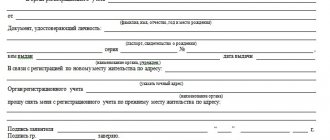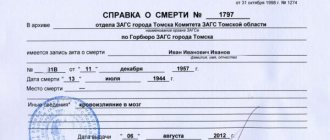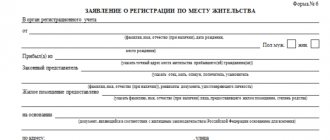Who can the owner of the apartment write out and why?
Citizens officially registered at their place of residence with the Migration Department of the Ministry of Internal Affairs are discharged. These do not include those living on a rental basis or persons living illegally (without temporary registration). The owner of the apartment, in the event of a termination of relations between family members (for example, a daughter left home more than 15 years ago and has never appeared in that entire time), based on the Housing Code of the Russian Federation, can deny the right to use her housing. Former household members and family members (adult children, wife, husband) who no longer live in the same premises with the owner, do not manage a joint household, do not help each other, do not pay bills around the house, lose their housing rights to the owner’s premises.
Forced eviction from the apartment
The owner of the property can initiate deregistration from a privatized apartment in several cases:
- if people who are not participants in shared ownership are registered in the purchased housing;
- during a divorce, when the former spouse and his relatives are registered in the apartment;
- non-payment of utilities by tenants, failure to fulfill other obligations;
- violation of the rights of other residents;
- causing material damage (illegal redevelopment, damage to property);
- failure to comply with sanitary standards;
- use of an apartment (house) for other purposes;
- antisocial and dangerous behavior of the resident.
When purchasing an apartment with registered people who do not claim housing, the new owner has the right to register them on a general basis. It is necessary to contact higher authorities (court, Department of Internal Affairs of the Ministry of Internal Affairs) if you need to discharge a person from home if he is absent for a long time. For example, a registered person lives outside the Russian state for a long time. In this case, the owner has the right to discharge the person without his consent.
This is interesting: How to write out and deregister a person who does not live in the apartment without his consent
The Housing Code provides for several more cases when a person can be discharged without his presence:
- a citizen is drafted into the army;
- the resident is serving a prison sentence;
- the person being discharged is declared missing or dead.
It is prohibited to remove a child from the apartment if he or his parents have no other living space. This rule does not apply to mom and dad.
Extract of ex-wife or husband
When considering divorce cases, lawyers often hear the question of whether the owner can expel a spouse from his apartment. It is permissible to deregister former relatives. But in a number of cases, the court does not give permission to discharge the ex-wife without his consent. For example, if:
- the apartment was purchased after marriage registration;
- the spouse owns a share in real estate;
- the former companion refused privatization in exchange for the right to lifelong residence.
Sometimes the court is in no hurry to discharge citizens who have broken the legal bonds of marriage if the ex-husband or wife does not have personal property.
Discharge of the deceased
After the death of a person, he is removed from registration at the place of residence. The discharge is carried out on the basis of the death certificate. The initiator must present his own passport. You should contact the passport and visa department. There is no need to take the document (passport) of the deceased with you, since when a death certificate is issued, it is destroyed.
Discharge of a minor
It is possible to discharge a minor citizen from his place of permanent registration if the child does not live at his registration address, but his rights are respected. A minor can be deregistered only together with his parents, otherwise this requires a decision of the guardianship council.
It is possible to discharge not an adult, but a minor child from the home only if the guardianship authorities provide the address of future registration. If one or both parents have been deprived of their legal rights to raise a child, the child retains the opportunity to use living space on equal terms with other citizens.
Discharge a person from an apartment without his consent
The procedure for discharge without consent depends on many nuances. If a citizen is registered in one place, but lives at another address, you need to send an official application with an offer to be discharged voluntarily.
It is possible to discharge a resident, if he is not the owner, when he regularly violates the rights of other people living in the same premises, public order, and norms for the use of living space. A rowdy person or the owner of a “brothel” can be expelled from an apartment without his consent on the basis of an application from residents, neighbors, or the district police officer.
How to discharge a tenant without his consent?
As we mentioned above, if the unwanted tenant is a tenant, the owner can only discharge the citizen by court decision. To do this, he must first make an appropriate appeal to the main owner, that is, in our case, to the municipality. And only after a certain series of actions in relation to the tenant who does not want to be checked out can you go to court.
But it is impossible to remove the owner from his own home! His state registration can be canceled only after he has lost ownership of the property by transferring it to another person.
In addition, lawyers note that it is almost impossible to evict minor children from their homes. To discharge children who have not yet turned 18 years of age, it is necessary to obtain permission from the guardianship authorities, who have the right to refuse the application if the financial situation of the child worsens as a result.
Thus, children who own a share of real estate or act as its owner cannot be legally deregistered without their consent.
EVERYONE NEEDS TO KNOW THIS:
How to draw up an apartment rental agreement between individuals without agents in 2020
The legislative framework
In our country, the procedure and standards for registration (as well as its cancellation) are regulated by Federal Law No. 5442-1 of June twenty-fifth, 1933 and the “Registration Rules” of 2020.
In addition, the Housing Code of the Russian Federation contains some provisions on the topic, the most important of which is Article No. 31, which outlines options for canceling a tenant’s registration without his consent. No less interesting is article No. 83, which describes the grounds for evicting a non-owner from an apartment.
Procedure for deregistration of residents
For example, I want to discharge a former relative who has been absent for a long time and unknown where, or to discharge an alcoholic son leading an immoral lifestyle. To achieve deregistration of a citizen, you need to come to the UVM branch at the place of registration or submit a statement of claim to the court. To consider the case, you must submit documents documenting the tenant’s unlawful actions:
- copies of neighbors' statements to the police;
- protocols of conversations between the district police officer and the rowdy;
- photographs, videos and other documentary evidence of disruption of public order.
This is interesting: Housing issue: how to check out of an apartment and where to go to register?
When considering the case, the court decides whether to remove the tenant from the place of current registration. This is where his powers end.
Where should the owner go to discharge a person?
The court does not carry out the execution of the decision to deregister citizens. To discharge a person from the occupied living space after a court decision, the owner must submit to the passport and visa service:
- resolution of a judicial authority with a mark of entry into force;
- application addressed to the head of the Department of Internal Affairs;
- documents for the apartment, house register.
The presence of the person being written out is not required for deregistration.
Evict and discharge a person from a privatized apartment
It should be understood and distinguished that deregistration and actual eviction are two different things. If the tenant ignores the court decision and continues to occupy the living space, the owner, three days after the citizen is deregistered, can contact bailiffs or law enforcement officials. They are able to expel an unwanted person by force, but only if the applicant provides the original court order and a certificate from the passport and visa service about eviction.
From council housing
The administration can deregister citizens from a social rented apartment. The grounds for this do not differ from those that apply to a private apartment:
- non-payment of housing complex services;
- long absence from the place of registration;
- inappropriate use of living space;
- deterioration of the technical condition of the apartment (illegal redevelopment, damage to property);
- violation of sanitary standards;
- antisocial behavior.
According to Art. 35 of the Housing Code of the Russian Federation, it will be possible to discharge a tenant from a municipal apartment only with the involvement of the courts.
Extract and eviction through court
Before filing a claim, it is necessary to clarify the data on the basis of which a tenant can be discharged without his consent or even presence. It should be understood that one statement to the court will not be enough. It is necessary to substantiate the facts of the citizen’s absence, threatening or immoral behavior, testimony of witnesses about the defendant’s offenses, and characteristics from the HOA servicing the house. When going to court, you need to correctly draw up an application indicating the regulations confirming the legality of the eviction.
Can an apartment owner sign out a registered relative?
4. Use of the apartment by residents for purposes other than its intended purpose. A municipal apartment is transferred to the tenant under a social tenancy agreement only for living, so using it for any other purpose (for example, as an office space) is a violation of the terms of the agreement and may lead to forced eviction and deregistration of the tenant and his family members.
In this case, the basis for filing a claim in court to recognize a citizen as having lost the right to use a residential premises (apartment) will be clause 4 of Article 31 of the Housing Code of the Russian Federation, according to which, in the event of termination of family relations with the owner of the residential premises, the right to use belongs to a former family member the owner of the residential premises is not retained.
27 Jun 2020 glavurist 199
Share this post
- Related Posts
- Who Has the Right to Receive Compensation for Utilities
- How to find out who owns a house by address
- How to fill out an employment contract sample completed 2020
- To which court is the state fee paid when filing an appeal?
Discharge to nowhere
How can an owner discharge a tenant if he has no other property to stay in? You can evict a person from an apartment under the conditions proposed above:
- in case of his long-term absence from the address;
- if the tenant does not participate in the payment of utility bills, repairs and maintenance of the apartment;
- during the privatization of municipal property;
- with immoral (antisocial) and dangerous behavior for neighbors.
In these cases, you can act through the Migration Office or through the court.
Can an apartment owner sign out a registered relative?
There are plenty of reasons why a homeowner may need to evict someone from their apartment, but mainly it is an unwillingness to continue coexistence. Whatever the reasons, it is important to know how this can be done according to the law, how the owner of the apartment can discharge the registered tenant , and in which cases it is possible to discharge an unwanted tenant and in which it is not.
As mentioned above, registered citizens bear some responsibility when living in an apartment and must obey the rules. And if the owner notices the rules, he can submit an application to the municipal authorities. In this case, the municipality will be able to evict the owner's relative without his consent.
Interesting: What Documents Do You Need to Submit to the Tax Office to Receive a Property Deduction?
How to sign out without personal presence and participation
Every person has the right to cancel their registration voluntarily. The owner can also do this if he needs to register at a different address. The deregistration occurs on the basis of a citizen’s application submitted to the Migration Department of the Ministry of Internal Affairs. To deregister at the applicant's place of residence, only a passport is required.
You can check out of your apartment without personal presence. For example, through the State Services website, where there is a corresponding service. You can initiate deregistration with the UVM by filling out only passport data and an application in electronic form. The employee must set a date for a visit to the department to verify passport data. The procedure takes 3 days, after which the applicant receives a notice of termination of registration by email.
This is interesting: How to expel your ex-husband from an apartment without his consent
Can the owner expel a registered person from the apartment without his consent? Does he have the right?
To exercise control within the country, the authorities are trying to streamline the internal migration process.
That is why registration was introduced for a limited period. That is, when a citizen of the Russian Federation lives for more than 90 days in a place other than his place of permanent residence, he is forced to temporarily register at this address. This requirement is specified in paragraph 55 of the Administrative Regulations.
Necessary algorithm of actions to obtain temporary registration:
- Preparation of necessary documents and their copies (hire agreement, passport, application, etc.);
- Submitting collected papers to the authority dealing with this issue (passport office);
- Obtaining a certificate of temporary registration within seven days from the date of application (passport office).
It is important to know the main condition for the implementation of short-term registration: during temporary registration in residential premises, citizens are not deregistered at their place of permanent residence.
Only the owner can register a tenant on his property. Therefore, temporary registration allows citizens only to reside and does not give any other rights.
It should be remembered that expensive repairs carried out on the initiative of a temporarily registered person do not even give the right to lay claim to the property or part of it.
In this case, you can demand compensation through the court for the resources spent. However, most likely, the decision will not be made in favor of what is prescribed due to the fact that the owner did not give consent to carry out any work.
Responsibility for timely payment of utilities, proper maintenance and repairs in accordance with the Housing Code of the Russian Federation falls on the owner of the residential premises.
Thus, providers of residential complex services will have no claims against temporarily registered citizens.
In view of this, the owner agrees in advance with the user who is obliged to pay for the residential complex service and in what amount. The volume of services used is recorded using special devices or based on standards for their consumption.
Many owners are worried about whether a registered citizen will be able to claim part of the residential premises.
The law states that property cannot pass to a citizen only because of his registration.
The main risk for the owner when registering tenants for his living space is an increase in utility bills if the apartment does not have appropriate meters.
Still, the apartment owner must be aware of the latest additions to the law.
The temporary registration procedure can now be completed remotely using the Internet.
All that remains is to enter the address of the property owner and his full name. After this, the owner receives notification of newly arrived residents.
If the owner is against registration, then he simply applies to the relevant authorities with a request for cancellation - the temporary registration will be immediately canceled.
Frequent reasons for going to court regarding temporary registration:
- registration of temporary registration without the consent of the owner or absence of final
- registration deadline dates in documents;
- refusal of voluntary eviction;
- immoral behavior of temporary residents or unwillingness to pay utility bills.
Temporarily registered persons do not have the right to independently dispose of residential premises, but only to use them. Even in the case of privatization of living space, such citizens do not claim a share of housing.
But a tenant can legally extend the period of short-term registration:
- A temporarily registered pregnant woman or a disabled person has the right to an extension of this period.
- A minor child can be discharged from an apartment only with the consent of the guardianship authority, and obtaining it is not a simple procedure.
When a tenant does not want to voluntarily move out and be discharged, they must go to court.
In addition, the court is presented with documents confirming the violations of the temporary resident.
However, if there are insufficient reasons, you will have to wait until the registration deadline.
With a temporarily registered minor, who is subject to all parental rights for hire, things are different. Only consent from the guardianship authority gives the right to be discharged from the living quarters.
Alimony obligations between the apartment owner and the temporary resident will complicate the procedure for deregistering them.
It is impossible to evict a family member and former spouses of the owner from a privatized apartment who lived with him during the period of privatization, but did not take part in it.
In addition, housing disputes between spouses have a number of features (time and grounds for purchasing housing, etc.).
Acquiring ownership of a residential premises with persons registered in it is a rather reckless act. Of course, different situations arise in life, but you should always study the situation in detail. If there are reasons to trust the former owner, then you can leave him registered for a while, since he may need this to avoid a fine for living without registration, provided for in Art. 19.15.1 Code of Administrative Offenses of the Russian Federation.
There may also be people who are not the most conscientious and can create serious problems. For example, they may refuse to move out or simply check out of the apartment. In this case, you will have to resort to legal proceedings. In addition, there are citizens whom even the court cannot discharge without their consent.
The most serious problem when purchasing an apartment with persons registered in it may be the presence of citizens whom the new owner does not have the right to discharge. This category includes:
- Former family members living in a privatized apartment, if they refused privatization, but initially had the right to do so (Article 19 of the Federal Law of December 29, 2004 No. 189-FZ “On the entry into force of the Housing Code of the Russian Federation”).
- Article 19 of the Introductory Law to the Life Fund of the Russian Federation:
- “The provisions of Part 4 of Article 31 of the Housing Code of the Russian Federation do not apply to former family members of the owner of a privatized residential premises, provided that at the time of privatization of this residential premises, these persons had equal rights to use this premises with the person who privatized it, unless otherwise provided by law or a contract."
- Persons who have the right of lifelong residence as a result of a testamentary refusal. Even if the owner of the apartment is different, the will of the testator may grant him the opportunity to be registered in the premises for the rest of his life. Only the will of the legatee is the basis for discharge from the residential premises (Part 4 of Article 1137 of the Civil Code of the Russian Federation).
- A person who has a share in a housing cooperative. If the owner of the majority of the share in an apartment has sold it to another person, the latter does not have the right to evict the other shareholder, with the exception of the full redemption of the share.
- Minor citizens living in orphanages, but having a residence permit in an apartment that they were forced to leave.
The listed categories of persons can be discharged exclusively on a voluntary basis, since in fact housing is assigned to them for life. Moreover, even the court cannot deprive them of registration.
Registration takes 3-5 days at most. Simultaneous registration and discharge require a longer period - from 14 to 30 days. But this is in case of termination of the right to use residential premises with the consent of a relative. Going to court increases the waiting time for a result - court hearings last 2-3 months. The process may take longer due to the complexity of the case or the defendant's ongoing appeals.
You can learn more about the deadlines for checking out of an apartment from our article.
We invite you to read: Dispute over the lower and upper bunk on the train
Deregistration (extract) of residents from apartments, both public and privately owned, can be voluntary or forced.
The tenant checks out himself if he registers in another housing or moves. Forced deregistration is carried out by court decision and is possible if there are compelling reasons: the citizen’s absence for a long time, non-payment of utility bills, and so on.
Articles 209, 288 and 292 of the Civil Code of the Russian Federation provide for the rights of the owner to housing, namely: use, disposal, possession.
These rights are exercised by the citizen who owns the property in accordance with the purpose of the residential or non-residential space. Moreover, the owner can either personally reside in the apartment or house, or settle (register) his relatives or third parties in it.
The owner can expel people from the apartment with or without their consent (by court decision).
There are certain nuances when checking out different categories of people from housing:
- It is easy to write out your ex-spouse if the apartment was purchased by the husband or wife before the marriage. One of the spouses automatically loses the right of residence after a divorce, which is enshrined in Art. 31 of the Housing Code of the Russian Federation.
- To remove a minor child from an apartment, you must obtain permission from the guardianship and trusteeship authorities. This government body considers each case individually and monitors compliance with the rights of the child when changing place of residence.
- The owner can deregister a person who is serving a sentence in prison according to a court verdict. However, upon release, the latter has the right to register in this apartment.
- Also, the owner can discharge the tenants (even without their consent) if he became the owner of the apartment by inheritance, as a result of a donation.
| Video (click to play). |
All other cases of forced deregistration are considered by the court individually.
The owner of an apartment can register a person in it with the consent (written) of all owners of this premises. The exception is a child - he is automatically registered at the place of registration of one of the parents without obtaining permission from the owner.
It is not difficult to discharge a tenant from privatized housing. Difficulties may arise only with a municipal apartment.
The owner is not required to be present during this procedure, that is, the person independently goes through the process of deregistration.
No title deed is provided. The application is reviewed within three working days.
To voluntarily check out of an apartment, you must have:
- Russian passport of a citizen, which is deregistered.
- For men, a military ID is attached to the passport. In case of its absence, a certificate of deregistration from military service.
- If the check-out takes place not from an apartment, but from a house, you must present the house register. In it, just like in the passport, a note about departure is made.
- If deregistration is carried out by an authorized person, the text of the power of attorney itself must contain a clause giving the right to perform these actions. The notary certifies not only the power of attorney, but also the Form 6 application requesting deregistration.
Info
Documents Along with the application, the plaintiff submits the following documents:
- copy of passport;
- title documents for the apartment (sale and purchase agreement, inheritance, gift);
- receipts for utility bills;
- an extract from the house register;
- certificate of divorce (if spouses divorce);
- confirmation of violations on the part of the tenant - testimony of neighbors, expert opinions on the amount of losses due to damage to property, etc.
- receipt for payment of state duty.
Evidence must complement the overall picture of what happened. The court will take the plaintiff’s side if the arguments confirm the fact of violations on the part of the temporarily registered person. Deadlines Deregistration occurs no later than 3 days from the date of publication of the court verdict (Art.
Important
The FMS is quite slippery and full of holes (lawmaking in the Russian Federation is in great decline) - after all, in fact, the regulations do not provide for any check as to whether a citizen has really DEPARTED (??)... ... it turns out that any unscrupulous owner can easily and arbitrarily remove it from the registry. registration of a bona fide resident and registered tenant... (!!) due to allegedly “early departure” without “trial or investigation”... .. and in the event of such a situation, the tenant will have to restore his registration record in court... Before you can discharge him, you need to go where — then register it. You discharged him, and then?... Will he hang in the air? May Study carefully Chapter V, Article 30, second paragraph.
Important
But as practice shows, the period can last for 2-3 months. Why is this happening? In most cases, the discharged tenants live in another city. At the same time, residents are not exempt from paying utility bills at the place of temporary registration.
The state duty can be paid at the cash desk of any Russian bank (for example, Sberbank). Thus, the discharge of temporarily registered persons without their consent occurs through the court. The reason is considered to be inappropriate behavior of the residents.
- Info
A document confirming the right to reside in a specific housing (for example, a lease agreement);
- Written consent to stay from all adult homeowners;
Deregistration by proxy
Registration at the place of residence, as well as registration by proxy, should only be done if the citizen is unable to personally attend the procedure. This document should be drawn up in a notary's office and certified by a notary. The process requires time and material costs associated with obtaining competent legal assistance in drawing up a power of attorney and knowledge of the laws. Registration authorities refuse to remove and register (as well as register) citizens by power of attorney, so it will take a lot of work to defend the right to carry out the procedure under a formalized power of attorney.
Reasons for discharging a person after a long absence
If a citizen is registered in one place, but in fact lives in another, this may serve as a reason for his eviction. The exact time for which a citizen must be absent for his discharge is not indicated in the Housing Code. By default, long-term disappearance is considered to be 1 year. An exception will be situations when a person’s absence is temporary (for example, he is serving in the army, is on a business trip or undergoing treatment).
The grounds for deregistration in case of long-term absence are:
- if the registered person has completely removed his belongings;
- the citizen does not pay utility bills and other bills;
- the tenant entered into a new marriage.
An important criterion for the discharge of a citizen who has not lived for a long time is the absence of obstacles to returning to the house he left on the part of the owner and other residents.








